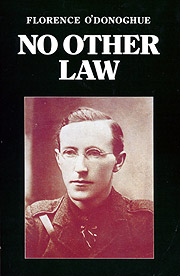
'WE HAVE DECLARED FOR AN IRISH REPUBLIC AND WILL NOT LIVE UNDER ANY OTHER LAW' - Liam Lynch
The Treaty between Britain and Ireland, which brought to an end the hostilities which had begun in Easter Week 1916, was signed on 6 December 1921, under Lloyd George's threats of 'immediate and terrible war'. It disestablished the Republic and partitioned Ireland.
Two days later, the Irish Cabinet voted in favour of accepting it, by four votes to three; and the following month the Dail approved it by 64 votes to 57.
Diehard Republicans rejected it. One was Liam Lynch, who wrote just after it had been signed: 'If I were to stand alone, I will not voluntarily accept being part of British Empire.' For three agonizing months, efforts were made to reconcile the pro and anti-Treaty parties. They failed. In April 1922, Republican forces occupied the Four Courts in Dublin. In June the Provisional Government's demand for its surrender was resisted, and so began 'immediate and terrible war', not this time between Irish and British but a civil war which set Irishman against Irishman. It was to end in May 1923 with the defeat of the Republicans.
Ernie O'Malley wrote of his Republicanism: 'A strange love was born that for some was never to die until they lay stiffen a hill�side or in quicklime near a barrack wall.' For Liam Lynch the end came on 10 April 1923. On a windswept hill on the borders of Counties Tipperary and Waterford, one thousand Free State troops began a dawn search for IRA leaders. A few hours later, Liam Lynch fell, mortally wounded. Before he died he said, 'Poor Ireland. All this is a pity. It never should have happened.' He was not yet thirty years of age.
No Other Law, first published in 1954, is a full and factual account of the life and times of Liam Lynch, written by a man with inside knowledge of the period. But it is also a story as human and personal as a novel. It is an important part of the history of the years of resurgence.
ISBN 0 947962 12 3